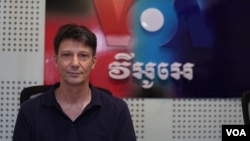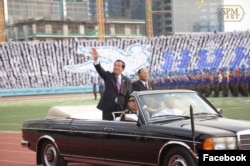[Editor’s Note: Marc Baudinet, author of “Cambodia In The Twenty First Century: A Short Social Study”, sat down with VOA Khmer’s Ky Mengly to share the key takeaways from his recently published work and his observations of the country, from the state of the rule of law to domestic politics, foreign policy and socio-economic progress.]
VOA: How long did you spend researching and writing this book?
Baudinet: I came here the first time in 2010. I come from Europe. Everything was very different, quite amazing compared to where I come from. And I was struck straight away by how different things are and how I couldn’t quite understand how people interacted. So, I wanted to know more about that and I started doing interviews, asking people questions in a very informal ways. Why’s this and why’s that? And much later basically three years ago, I thought I could write something about how Cambodians are changing fast. Therefore, it would be interesting to observe Cambodian society now. That’s how I got the idea to do the book. And it took me two and a half years to write this.
VOA: Can you tell us briefly what your book is about?
Baudinet: My book is exactly about “Cambodia in the 21st century”. I thought the book could include some kind of photos of Cambodian society now. What is happening and what is changing, from a traditional to a more modern society. People’s education is improving, more people are going to school, people are buying cars, mobile phones, and people are getting jobs that never really existed here before. So, there is a lot happening in this society and this is my point really. And how is that affecting the traditional society? What are the consequences on how people interact? All of these interest me and basically that’s my reason why I wrote the book.
VOA: In the book you seem to lack optimism about the current Cambodian government. Why is that?
Baudinet: So, I started writing the book in 2016 and everyone was talking about the Commune Elections in 2017 and the General Elections in 2018 and I thought that many people were quite optimistic that things could change and then suddenly there were upheavals. Everything took a different path in November 2017. The rule of law is a key aspect of a successful society. If you take Singapore and Singapore’s rule of law is very strong, meritocracy is very strong, good governance is very strong and that society is very successful. Here, the rule of law is shaky. It is very much about having more money than whoever is against you. Therefore, there is a problem for people to trust in their own society and have the courage to invest for instance when they know possibly that the law is not on their side because they’re not rich enough for instance. Meritocracy is also very important. It is improving I think. I think that there are many problems. I think as education is improving, meritocracy is also more valued than a few years ago. So, this is very good for the future. However, there is still a long way to go. So, I’m sometimes optimistic and sometimes a bit pessimistic here.
VOA: You mention in the book that the “natural order” in Cambodia does not sit well with democracy. What do you mean by that?
Baudinet: The idea of democracy … is that basically every individual every person has the same rights and has the same value. No matter whether they’re a cleaner, a poor farmer, they’re as important as rich land owners or rich business persons. Everyone, when people vote, everyone is the same. Equality is very much the key or let’s say not the key but the grounding within which democracy can grow. Now here in the traditional society in Asia in general not only in Cambodia, the idea that everybody is equal is not part of a traditional understanding of how a society functions. People accept that there is an elite and then there are a lot of other people and those people should just do their work and not challenge authority. Therefore, here I think in terms of democracy, the idea that everyone is equal, is possibly not yet accepted, especially by of course the elites.
VOA: Towards the end of the book you draw a comparison between King Ang Duong’s embrace of France and Prime Minister Hun Sen’s embrace of China. What is the implication of this?
Baudinet: Geopolitics is very much a power game between different players; some are big players and some are smaller players. Cambodia, in the 19th century, had a lot of problems with its two bigger neighbors: Vietnam and Thailand. For Cambodia, the king decided to call a third power to somehow help. But there was a price that possibly the king did not realize. Cambodia became a colony, lost its independence. Now of course, the situation is very different. The context is vastly different from those days. However geopolitics remains of course a power game. I was wondering whether the way Cambodia today is possibly giving too much to China or a lot to China. Is it going to affect in the longer term prospects of Cambodia’s independence. Not that China is going to colonize Cambodia. No, those days are over. But there are other ways to manipulate or influence smaller countries.
VOA: Do you suggest it is a characteristic of Cambodia that its rulers are always seeking foreign intervention?
Baudinet: I wouldn’t go that far. I wouldn’t say that Cambodia always asks for help from foreign powers but the fact of the matter is every country in the world, every country interacts, trades; people move; people travel and therefore every country must deal with other powers. This is just I guess the natural order of things as well. Western countries have done a lot of damage here and then of course the Cold War, the Vietnam War. And this is the way things go. And I suppose now for Cambodia ... what is the right balance between China on the one hand and the Western world or the USA on the other hand?
VOA: How do you think the recent crackdown on the opposition will impact Cambodian society?
Baudinet: I think today Cambodian society is at a crossroad. What happened in 2017 and 2018 probably the future will tell. It is probably a turning point. It seems society is divided. On the one hand, you have the people who would like things to change; they would like maybe a more open society. On the other hand, you have people who would rather keep the status quo. So, for Cambodia and Cambodian people, what will they choose to do? Will they agree to continue following the same path, or will they demand a change? The future will tell. But I think that in the future we will remember 2018 as well as possibly 2017 as a turning point.
Note: This interview was edited for clarity and length.







